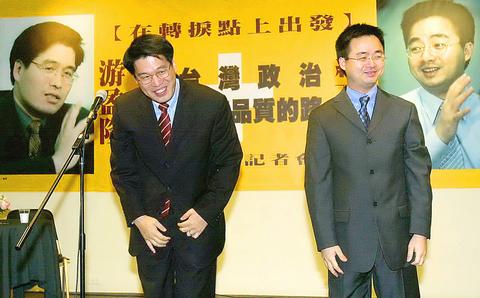Two Cabinet members yesterday announced plans to resign from their current posts to run in the upcoming legislative elections, saying they hoped their participation in the race would help break Taiwan's current political stalemate.
Vice Chairman of the Council for Cultural Affairs Luo Wen-chia (

PHOTO: CHU YO-PIN, TAIPEI TIMES
Luo plans to run in Taipei City, whereas You intends to campaign in Hualien County.
"It will be a new beginning for me to join the race, and I know it will be tough. But I look forward to making a little change to the political atmosphere of the country, elevating the quality of the legislation and bringing new ideas to the legislature," said Luo, an expert in campaign publicity for President Chen Shui-bian (陳水扁) for almost a decade.
Some politicians, however, saw the move as a sign the DPP was in crisis, and that the two deputy leaders had felt trapped in positions where their abilities could not be brought into full play.
"It is rather unusual for executives to quit to join the campaign race. I think the DPP is facing some ruling difficulties because, after all, these DPP officials are more adept at election strategies, than administrating," PFP lawmaker Diane Lee (李慶安) told the Taipei Times.
"In addition, the two used to be rather active when the DPP was the opposition. But they've barely been heard since the DPP took power, and their performances in their present positions have hardly drawn any attention."
You said the DPP had so far been an ineffectual ruling party because of its disadvantageous position in the Legislative Yuan.
"Today's political deadlock stems from the DPP's minority status in the legislature, which has crippled the implementation of the governmental policies," said You, adding that he hoped that joining the legislature would help strengthen the DPP.
Director of the DPP's department of organizational development Liu I-te (
"It is kind of a waste for officials to run for elections ? I assume they have found themselves being placed in a difficult situation because they have not gained as much attention as they used to," Liu said.
Analysts, however, put a more positive spin on the move.
"I agree with You that running in the election is meant to help break the political impasse," said Wang Yeh-li (
"In accordance with our Constitutional system, the significance of the legislative branch will be increased gradually. If the ruling party does not enjoy a dominant position in the legislature, it will make policy execution almost impossible? I think the DPP's resolution to secure more seats at the legislature is definitely a good strategy."

MAKING WAVES: China’s maritime militia could become a nontraditional threat in war, clogging up shipping lanes to prevent US or Japanese intervention, a report said About 1,900 Chinese ships flying flags of convenience and fishing vessels that participated in China’s military exercises around Taiwan last month and in January last year have been listed for monitoring, Coast Guard Administration (CGA) Deputy Director-General Hsieh Ching-chin (謝慶欽) said yesterday. Following amendments to the Commercial Port Act (商港法) and the Law of Ships (船舶法) last month, the CGA can designate possible berthing areas or deny ports of call for vessels suspected of loitering around areas where undersea cables can be accessed, Oceans Affairs Council Minister Kuan Bi-ling (管碧玲) said. The list of suspected ships, originally 300, had risen to about

DAREDEVIL: Honnold said it had always been a dream of his to climb Taipei 101, while a Netflix producer said the skyscraper was ‘a real icon of this country’ US climber Alex Honnold yesterday took on Taiwan’s tallest building, becoming the first person to scale Taipei 101 without a rope, harness or safety net. Hundreds of spectators gathered at the base of the 101-story skyscraper to watch Honnold, 40, embark on his daredevil feat, which was also broadcast live on Netflix. Dressed in a red T-shirt and yellow custom-made climbing shoes, Honnold swiftly moved up the southeast face of the glass and steel building. At one point, he stepped onto a platform midway up to wave down at fans and onlookers who were taking photos. People watching from inside

Japan’s strategic alliance with the US would collapse if Tokyo were to turn away from a conflict in Taiwan, Japanese Prime Minister Sanae Takaichi said yesterday, but distanced herself from previous comments that suggested a possible military response in such an event. Takaichi expressed her latest views on a nationally broadcast TV program late on Monday, where an opposition party leader criticized her for igniting tensions with China with the earlier remarks. Ties between Japan and China have sunk to the worst level in years after Takaichi said in November that a hypothetical Chinese attack on Taiwan could bring about a Japanese

The WHO ignored early COVID-19 warnings from Taiwan, US Deputy Secretary of Health and Human Services Jim O’Neill said on Friday, as part of justification for Washington withdrawing from the global health body. US Secretary of State Marco Rubio on Thursday said that the US was pulling out of the UN agency, as it failed to fulfill its responsibilities during the COVID-19 pandemic. The WHO “ignored early COVID warnings from Taiwan in 2019 by pretending Taiwan did not exist, O’Neill wrote on X on Friday, Taiwan time. “It ignored rigorous science and promoted lockdowns.” The US will “continue international coordination on infectious